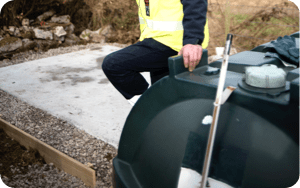When you’ve been looking for heating oil, the chances are you’ve come across the terms paraffin and kerosene. But what exactly do they refer to and what is the difference between them? Here, we take a look at the meaning of these words and how they differ, and reveal whether you can use paraffin or kerosene to heat your home.
What is kerosene oil?
When you need a heating oil to power your boiler and provide heating and hot water, kerosene is your best bet. Also known as ‘28-second oil’ or simply ‘heating oil’, kerosene is a light, clean and efficient fuel.
Kerosene also has a high flash point, which is the temperature at which it creates a flammable vapour near its surface. The high flash point makes kerosene a very safe option for domestic heating systems. With 1.5 million homes relying on heating oil in the UK, kerosene is the most commonly used to heat our homes.
Kerosene comes in the form of a flammable liquid that’s typically pale yellow or colourless and has a distinctive but not unpleasant smell. Initially, kerosene was made from shale oils and coal tar, but after the drilling of the first oil well in America, petroleum rapidly became the main source.
Kerosene has a number of uses in addition to being a popular heating oil. For example, kerosene can be burned in oil lamps to provide lighting. In fact, before the emergence of gas and electricity as power sources, kerosene was the world’s dominant fuel for lighting and heating. This oil can also be used as a fuel component or fuel for jet engines.
Thinking of using kerosene in your oil fired heating system? Learn more about the benefits.
What is premium kerosene?
You might have also heard of premium kerosene. This is kerosene that has been treated with a number of additives to provide an even more efficient source of energy. A more contemporary version of regular kerosene, this premium heating oil helps to prevent sludge and carbon from building up in your fuel tank. As a result, premium kerosene lasts longer and promotes the longevity of your heating system too.
Premium kerosene is more expensive than standard kerosene, but can be more cost-effective. Over the long term, premium heating oil will help you avoid costly heating system repairs and reduce the number of times you need to top up your fuel.
Premium kerosene is therefore a great option if you want to improve the efficiency of your home heating system. In particular, premium kerosene is good for households with an AGA or Rayburn cooker.
Discover more about premium kerosene.
What is paraffin?
Things get a little confusing when we try to differentiate between kerosene and paraffin. As mentioned previously, these terms can be used interchangeably. So, kerosene is often referred to as paraffin.
In more general terms, paraffin describes a group of hydrocarbons with the chemical formula CnH2n+2. Paraffins are major constituents of petroleum and natural gas. Those containing fewer than five carbon atoms per molecule are usually gases at room temperature, while those with between five and 15 carbon atoms are typically liquids. Straight-chain versions with more than 15 carbon atoms per molecule occur as solids at room temperature.
As well as a liquid fuel (kerosene), paraffin is used in different forms, including: paraffin wax and petroleum jelly. Paraffin can also be used as a lubricant for machinery and a coolant for electrical systems, as well as a hydraulic fluid and even an insecticide.
So, while there is an overlap between the terms paraffin and kerosene, paraffin has a broader meaning and a wider range of applications.
Can I use paraffin instead of kerosene?
In the UK, kerosene is often referred to as paraffin when talking about heating oils. Therefore, you will likely be getting the same product regardless of what your heating oil is called. In other words, it doesn’t matter whether your supplier describes the fuel as kerosene or paraffin oil. In both cases, you can use the product to power your heating system.
Occasionally, paraffin refers to a more refined and distilled version of kerosene. This version can be more suitable for indoor uses, such as for example in lamps and stoves. This type of paraffin includes additives to reduce its odour.
Kerosene is more suited to use in home heating systems. If a supplier uses the term paraffin to describe a premium grade kerosene, this means you are getting a higher quality kerosene product that will fuel your appliances even better than standard kerosene.
Understanding the benefits and limitations of different fuel types is important when buying oil supplies to run your heating system. So, if you’re still unsure which fuel is right for your heating system, get in touch to find out more.





